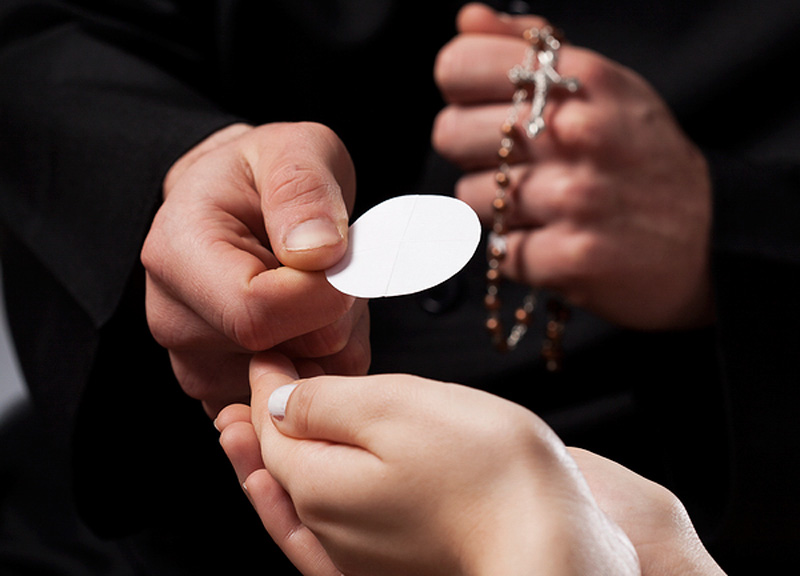
MYRTLE BEACH—Many people take Communion every Sunday, but never stop to think about what, exactly, they are receiving.
Stop and consider that Jesus Christ is really and truly present in the consecrated host.
That subject has been the focus of a recent month-long study on the Blessed Sacrament at St. Andrew Church.
The study is being led by Jeff Vehige, a parishioner with degrees in theology from the University of Dallas. Vehige was a catechist formation instructor for the Diocese of Dallas before moving to Myrtle Beach with his family.
He said helping people understand the importance of the Eucharist is a way to help them more deeply understand their faith.
“My goal is to inspire people to have a greater love of Christ and the Church, and also a greater love of the Eucharist,” Vehige said.
Understanding Christ’s presence is also a way to connect with the living history of the Church and gain a greater enthusiasm and understanding of the sacrifice of the Mass.
“The Eucharist is nothing new — we have been doing this for 2,000 years,” Vehige said. “What we do every Sunday at Mass is what Christians did at the beginning of the Church. The more people know and understand about the Eucharist, the more they can grasp on this incredible reality of what we do at Mass. I’ve met a lot of fallen away Catholics who said they stopped going to Mass because it didn’t do anything for them. I tell them, ‘If you truly knew what the Mass was, you would be there.’”
In the four-week study, participants have been learning what Scripture, the early Church fathers and popes have said about the Eucharist. Here is a look at some of the perspectives they offer:
The Old Testament contains several passages which prefigure Christ’s sacrifice and His real presence in the Eucharist.
This is especially true in verses that describe the sacrifice of the Passover lamb (Ex 12:1-4) and instruct the Jewish people to regularly commemorate the Passover as a remembrance of how God saved them (Ex 12:43-49).
Images of sacrifice from the Old Testament are echoed in descriptions in the Gospel of how Christ will himself become a perfect sacrifice for the sake of humanity.
The sixth chapter of the Gospel of John deals extensively with the nature of Christ’s presence in the Eucharist. In John 6:25-59, a passage known as the “Bread of Life” discourse, Jesus discusses the sacrifice which is to come, portrays himself as the Bread of Life, and describes how eternal life will come to those who accept Him.
One of the most vivid passages is:
“Amen, Amen, I say to you, whoever believes has eternal life. I am the bread of life. Your ancestors ate the manna in the desert, but they died; this is the bread that comes down from heaven so that one may eat it and not die. I am the living bread that came down from heaven; who eats this bread will live forever; and the bread that I will give is my flesh for the life of the world.” (Jn 6:47-51)
Vehige offered several passages from early Church fathers and teachers that show the importance and the centrality of the Eucharist to the whole of the faith. A powerful description of the sacrament’s importance and how it should be received comes from St. John Chrysostom.
“Let then no one approach the Eucharist with indifference, no one faint-hearted but all with burning hearts … Consider how indignant you are against the traitor, against those who crucified him. Watch, therefore, lest you also yourself become guilty of the body and blood of Christ … What purity should that person have who enjoys this sacrifice? How much purer than the rays of the sun should be the hand that touches this flesh, the mouth which is filled with spiritual wine, the tongue tinted with the awe-inspiring Blood? … with this sacrifice we are fed, with this sacrifice we are commingled, and we are made one body and one flesh with Christ.”
St. Ignatius of Antioch described how the Eucharist not only leads to eternal life, but helps the faithful live good lives and avoid evil: “Try to gather more frequently to celebrate God’s Eucharist and to praise Him. For when you meet frequently, Satan’s powers are overthrown and his destructiveness is undone by the perfect agreement of your faith.” St. Ignatius also described the Blessed Sacrament as “the medicine of immortality, and the antidote which wards off death but yields continuous life in union with Jesus Christ.”
Vehige urges people to develop a devotion to the Eucharist in their daily prayer life. Consider the nature of Christ’s sacrifice, especially when praying the rosary, and contemplate it during adoration of the Blessed Sacrament.
“The Eucharist is considered the source and summit of our faith, and it should also be a source of our individual faith,” Vehige said. “If my faith is in Jesus Christ, and Christ is really present in the Eucharist, then I should also have a devotion to the Eucharist. All of my prayers should connect to this great eucharistic reality.”


